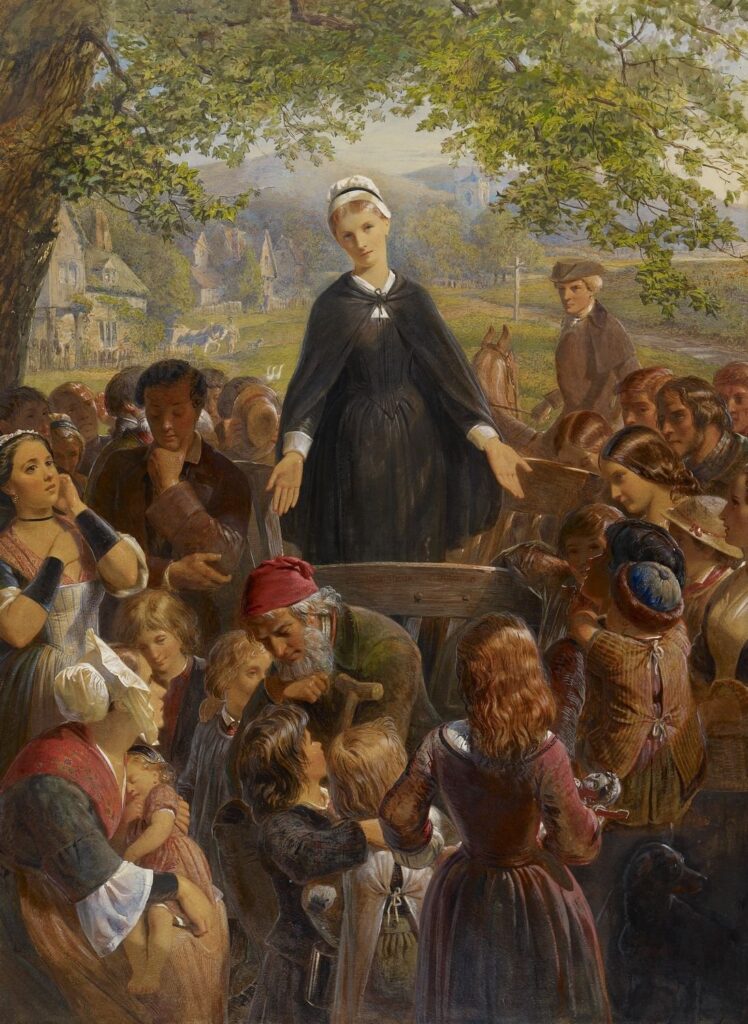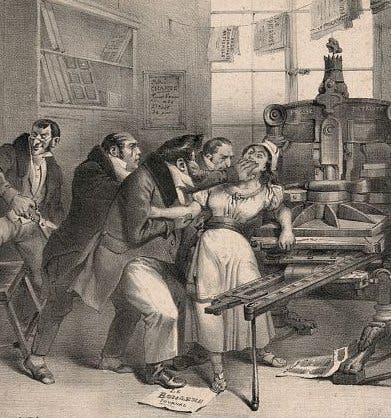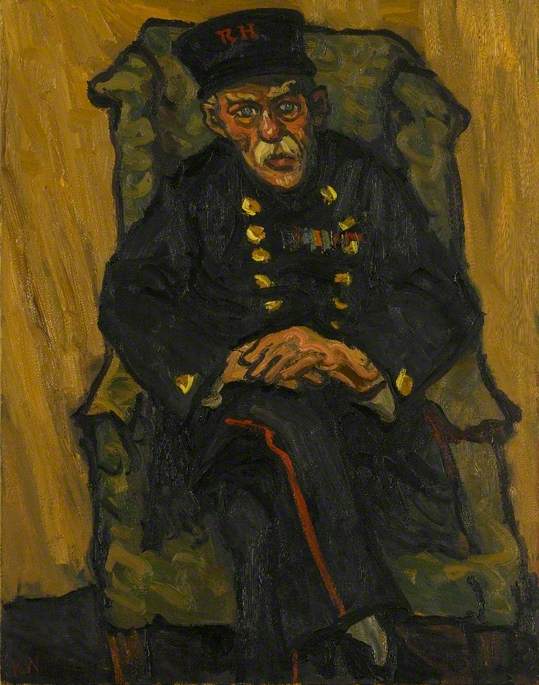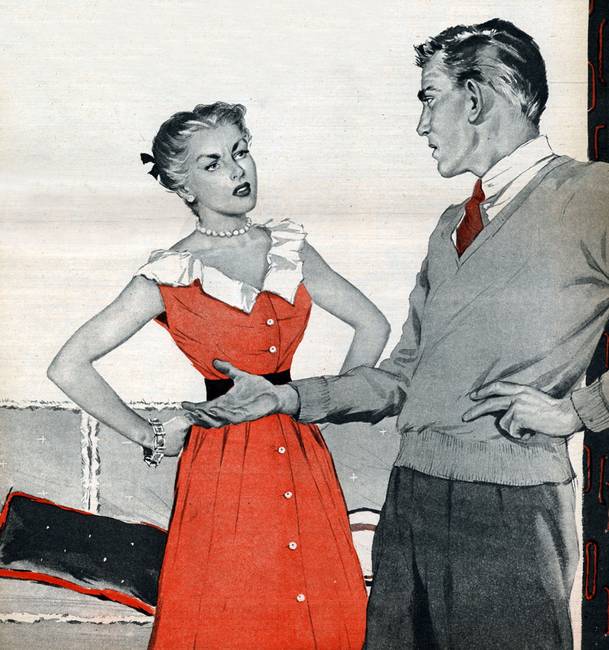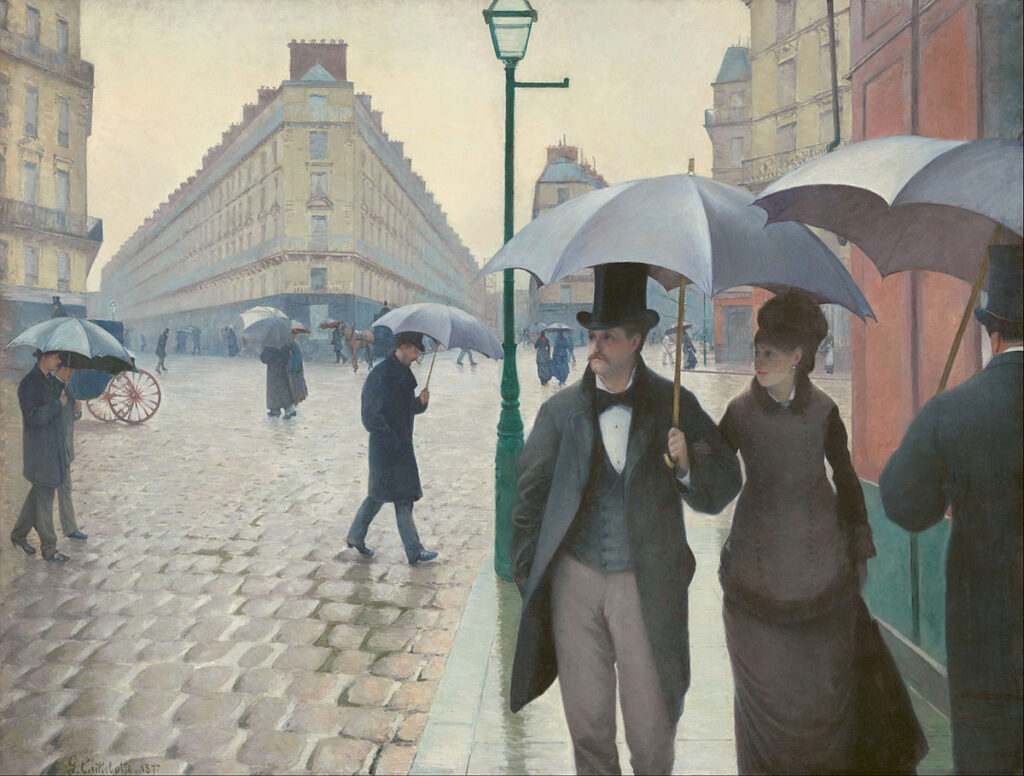Spiritual Sunday
Reprint of a Past Post
I reread George Eliot’s Adam Bede recently for the first time in decades and fell in love again with the itinerant Methodist preacher Dinah Morris. I share today her sermon on the Hayslope village green, which we watch through the eyes of a stranger.
It’s particularly interesting to read Dinah’s sermon at a time when church attendance in the United States is dramatically dropping. I don’t know if this is because people are turned off by the politicization of religion or for some other reason, but I find it sad that people are losing access to the spiritual nourishment that religion can provide. We need people like Dinah to help us get back in touch with the divine. Here’s the first half of Dinah’s sermon:
“A sweet woman,” the stranger said to himself, “but surely nature never meant her for a preacher.”
Perhaps he was one of those who think that nature has theatrical properties and, with the considerate view of facilitating art and psychology, “makes up” her characters, so that there may be no mistake about them. But Dinah began to speak.
“Dear friends,” she said in a clear but not loud voice “let us pray for a blessing.”
She closed her eyes, and hanging her head down a little continued in the same moderate tone, as if speaking to some one quite near her: “Savior of sinners! When a poor woman laden with sins, went out to the well to draw water, she found Thee sitting at the well. She knew Thee not; she had not sought Thee; her mind was dark; her life was unholy. But Thou didst speak to her, Thou didst teach her, Thou didst show her that her life lay open before Thee, and yet Thou wast ready to give her that blessing which she had never sought. Jesus, Thou art in the midst of us, and Thou knowest all men: if there is any here like that poor woman—if their minds are dark, their lives unholy—if they have come out not seeking Thee, not desiring to be taught; deal with them according to the free mercy which Thou didst show to her. Speak to them, Lord, open their ears to my message, bring their sins to their minds, and make them thirst for that salvation which Thou art ready to give.
“Lord, Thou art with Thy people still: they see Thee in the night-watches, and their hearts burn within them as Thou talkest with them by the way. And Thou art near to those who have not known Thee: open their eyes that they may see Thee—see Thee weeping over them, and saying ‘Ye will not come unto me that ye might have life’—see Thee hanging on the cross and saying, ‘Father, forgive them, for they know not what they do’—see Thee as Thou wilt come again in Thy glory to judge them at the last. Amen.”Dinah opened her eyes again and paused, looking at the group of villagers, who were now gathered rather more closely on her right hand.
“Dear friends,” she began, raising her voice a little, “you have all of you been to church, and I think you must have heard the clergyman read these words: ‘The Spirit of the Lord is upon me, because he hath anointed me to preach the gospel to the poor.’ Jesus Christ spoke those words—he said he came TO PREACH THE GOSPEL TO THE POOR. I don’t know whether you ever thought about those words much, but I will tell you when I remember first hearing them. It was on just such a sort of evening as this, when I was a little girl, and my aunt as brought me up took me to hear a good man preach out of doors, just as we are here. I remember his face well: he was a very old man, and had very long white hair; his voice was very soft and beautiful, not like any voice I had ever heard before. I was a little girl and scarcely knew anything, and this old man seemed to me such a different sort of a man from anybody I had ever seen before that I thought he had perhaps come down from the sky to preach to us, and I said, ‘Aunt, will he go back to the sky to-night, like the picture in the Bible?’
“That man of God was Mr. Wesley, who spent his life in doing what our blessed Lord did—preaching the Gospel to the poor—and he entered into his rest eight years ago. I came to know more about him years after, but I was a foolish thoughtless child then, and I remembered only one thing he told us in his sermon. He told us as ‘Gospel’ meant ‘good news.’ The Gospel, you know, is what the Bible tells us about God.
“Think of that now! Jesus Christ did really come down from heaven, as I, like a silly child, thought Mr. Wesley did; and what he came down for was to tell good news about God to the poor. Why, you and me, dear friends, are poor. We have been brought up in poor cottages and have been reared on oatcake, and lived coarse; and we haven’t been to school much, nor read books, and we don’t know much about anything but what happens just round us. We are just the sort of people that want to hear good news. For when anybody’s well off, they don’t much mind about hearing news from distant parts; but if a poor man or woman’s in trouble and has hard work to make out a living, they like to have a letter to tell ’em they’ve got a friend as will help ’em. To be sure, we can’t help knowing something about God, even if we’ve never heard the Gospel, the good news that our Saviour brought us. For we know everything comes from God: don’t you say almost every day, ‘This and that will happen, please God,’ and ‘We shall begin to cut the grass soon, please God to send us a little more sunshine’? We know very well we are altogether in the hands of God. We didn’t bring ourselves into the world, we can’t keep ourselves alive while we’re sleeping; the daylight, and the wind, and the corn, and the cows to give us milk—everything we have comes from God. And he gave us our souls and put love between parents and children, and husband and wife. But is that as much as we want to know about God? We see he is great and mighty, and can do what he will: we are lost, as if we was struggling in great waters, when we try to think of him.
“But perhaps doubts come into your mind like this: Can God take much notice of us poor people? Perhaps he only made the world for the great and the wise and the rich. It doesn’t cost him much to give us our little handful of victual and bit of clothing; but how do we know he cares for us any more than we care for the worms and things in the garden, so as we rear our carrots and onions? Will God take care of us when we die? And has he any comfort for us when we are lame and sick and helpless? Perhaps, too, he is angry with us; else why does the blight come, and the bad harvests, and the fever, and all sorts of pain and trouble? For our life is full of trouble, and if God sends us good, he seems to send bad too. How is it? How is it?
“Ah, dear friends, we are in sad want of good news about God; and what does other good news signify if we haven’t that? For everything else comes to an end, and when we die we leave it all. But God lasts when everything else is gone. What shall we do if he is not our friend?”
Then Dinah told how the good news had been brought, and how the mind of God towards the poor had been made manifest in the life of Jesus, dwelling on its lowliness and its acts of mercy.
“So you see, dear friends,” she went on, “Jesus spent his time almost all in doing good to poor people; he preached out of doors to them, and he made friends of poor workmen, and taught them and took pains with them. Not but what he did good to the rich too, for he was full of love to all men, only he saw as the poor were more in want of his help. So he cured the lame and the sick and the blind, and he worked miracles to feed the hungry because, he said, he was sorry for them; and he was very kind to the little children and comforted those who had lost their friends; and he spoke very tenderly to poor sinners that were sorry for their sins.
“Ah, wouldn’t you love such a man if you saw him—if he were here in this village? What a kind heart he must have! What a friend he would be to go to in trouble! How pleasant it must be to be taught by him.
“Well, dear friends, who WAS this man? Was he only a good man—a very good man, and no more—like our dear Mr. Wesley, who has been taken from us?…He was the Son of God—’in the image of the Father,’ the Bible says; that means, just like God, who is the beginning and end of all things—the God we want to know about. So then, all the love that Jesus showed to the poor is the same love that God has for us. We can understand what Jesus felt, because he came in a body like ours and spoke words such as we speak to each other. We were afraid to think what God was before—the God who made the world and the sky and the thunder and lightning. We could never see him; we could only see the things he had made; and some of these things was very terrible, so as we might well tremble when we thought of him. But our blessed Savior has showed us what God is in a way us poor ignorant people can understand; he has showed us what God’s heart is, what are his feelings towards us.”
Amen.
